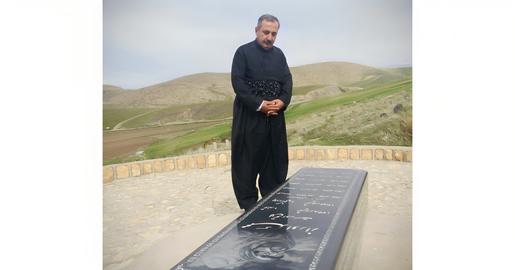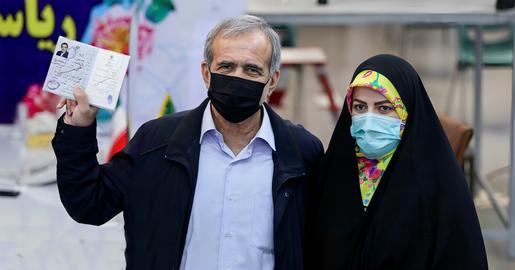The news that the Interior Ministry’s executive committees have disqualified a number of representatives in the 11th parliament of the Islamic Republic from running in the next parliamentary elections has not attracted much public attention in Iran.
The vote, set for March 1, will be the first since a bloody state crackdown quelled nationwide protests that erupted in September 2022.
***
A number of current members of the Islamic Republic’s parliament have been disqualified by executive committees from running in the next parliamentary elections, scheduled for March 2024. The disqualification of these well-known members of the 11th parliament, which the Supreme Leader Ali Khamenei had called the “revolutionary parliament,” shows the impasse in which even the political figures who are most loyal and obedient to Khamenei find themselves.
Disqualifications by executive committees that are appointed by the Interior Ministry are not something new and are usually the result of rivalries in electoral precincts. Each of the disqualified MPs are associated with certain controversies and, in the existing political atmosphere in Iran, their disqualification was not unexpected.
These disqualifications are not final and the ultimate decision rests with the Guardian Council, an unelected body that, among other things, is the final arbiter of whether a candidate qualifies to run in elections or not. The disqualifications do affect the voter turnout in the elections, but many other parameters are going to affect participation in the next year’s elections.
Who Are the Disqualified MPs?
Gholamreza Noori Qazaljah, the representative of Bostan Abad in East Azerbaijan province and the leader of the Independent Caucus, took to the social media platform X to announce his intention to protest his disqualification. He made the news when he disclosed in August that, according to the controversial “Hijab and Chastity” bill, if high school students commit the infraction of “bad clothing” three times they would be sent to the police.
In the 10th parliament, when Ali Larijani was the speaker, Noori Qazaljah was the chief deputy speaker.
Jalil Rahimi Jahan-Abadi, the Sunni representative from Torbat-e Jam in Razavi Khorasan province, a member of the parliament’s National Security and Foreign Policy Commission and the vice chairman of the Independent Caucus, also announced his disqualification on X. He made the news when he talked about the Afghan-Iranian nationality of MP Javad Karimi-Ghoddousi. The Islamic Republic does not recognize dual nationality.
In August, Jahan-Abadi spoke against the exile of the editor-in-chief of the Tejarat News website to his hometown of Torbat-e Jam.
Jalal Mahmoudzadeh, from the Kurdish-majority city of Mahabad in West Azerbaijan, was summoned by the prosecutor for supporting the people of his city and for condemning the violence committed by the security forces against them. He was the chairman of the Sunni Caucus in the 8th parliament.
Three MPs from Tabriz, the provincial capital of East Azerbaijan, have also been disqualified. They include Ahmad Alirezabeigi, a man close to former President Mahmoud Ahmadinejad. He told Shargh newspaper he had been disqualified due to a conviction in a case related to revelations that dozens of MPs were given SUVs to scrap a motion last year to impeach the minister of industry, mines and trade. After the November 2019 nationwide protests, Alirezabeigi called for the impeachment of Abdolreza Rahmani Fazli, former President Rouhani’s interior minister, saying he had “the people’s blood on his hand.”
Masoud Pezeshkian and Alireza Monadi Sefidan are the two other MPs from Tabriz who have been disqualified. Pezeshkian was the deputy speaker of the 10th parliament and the chairman of Azeri Caucus. He was also a presidential candidate a few times but was disqualified each time.
Monadi Sefidan was close to former speaker Ali Larijani and has not been very active politically. In recent days he has been in the news after he held talks with the representatives of protesting teachers.
There were also reports that Moinuddin Saeedi, a representative from Chabahar in the province of Sistan and Baluchistan, was disqualified, which he denied.
Also disqualified were Jalil Mukhtar, representative of Abadan in Khuzestan, and Somayeh Mahmoudi, a female member of parliament from Shahreza in Isfahan. Mohammad Ali Namazi, former MP from Lanjan in Isfahan and a member of the central committee of the reformist Executives of Construction Party, has also reported he had been disqualified.
Rajab Rahmani, member of parliament from Takestan in Qazvin province, and Ahmad Rasoulinejad, representative from Damavand in Tehran province, were disqualified as well. During a visit by Ezzatollah Zarghami, the minister of cultural heritage, handicrafts and tourism, to Qazvin, Rahmani refused to shake his hand and called him a “scoundrel.”
The Precedents
In the past election cycles, some members of parliament who had been disqualified by executive committees in charge of managing the elections were qualified in later stages. Some of the disqualifications have been the result of quarrels between the MPs and local officials.
In the past as well, a number of principalist and reformist MPs were disqualified by executive committees but were qualified in later stages.
In the elections for the 10th parliaments, 37 members of the 9th parliament, most of them principalists, were disqualified by provincial supervisory committees. However, later that year, a number of them, including Ali Motahari, were allowed to enter the electoral race.
Jalil Rahimi Jahan-Abadi, who has now been disqualified, was also disqualified by executive committees before the elections for the 11th parliament but was later qualified and was elected.
During the elections for the 11th parliament, the Guardian Council, which has the last word on who should run or not, disqualified 90 members of the 10th parliament. The council’s spokesman claimed they had been disqualified mainly for “financial corruption,” but later some of the MPs revealed they had been disqualified for their lack of “practical” loyalty to Islam and the supreme leader.
Disqualifications and Electoral Participation
The disqualifications mentioned above happen at a time when the Islamic Republic’s security agencies have been forcing some members of previous parliaments to start campaigns and run for the 12th parliament. Nevertheless, the new requirement for “candidacy pre-registration,” whereby those seeking candidacy must upload some documents about themselves to an Interior Ministry website, has caught reformists and some members of previous parliaments off guard and has reduced the number of registrations. This new policy is at odds with previous claims by the government that it welcomes more candidates.
This shows that the government of the Islamic Republic still has no serious interest in having popular figures run for parliament in order to increase voter turnout.
“If, like the presidential elections, the reformists do not enter the arena, I believe that the competition among the principalists would increase the voter turnout,” said Manouchehr Mottaki, Ahmadinejad’s foreign minister.
However, with the collapse of the regime's legitimacy among Iranians following the bloody suppression of protesters in 2022, it is unlikely that the competition among the principalists would have any effect on voter participation. And it appears that the government is following an old scenario to increase the turnout.
They are investing more in small towns than big cities. In some electoral precincts, composed of more than one town or home to various ethnic groups, security agencies might field numerous candidates to make the atmosphere more exciting and increase voter turnout.
However, doing this in big cities is more difficult because elections there revolve around parties and political affiliations. Also, naturally, one can expect lower turnout in provinces that witnessed widespread protests last year.
visit the accountability section
In this section of Iran Wire, you can contact the officials and launch your campaign for various problems































comments